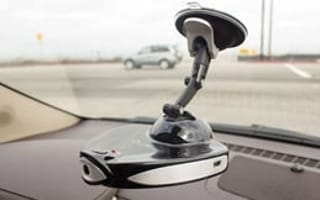[ibimage==34681==Original==none==self==ibimage_align-center]
The nature of Niko Stoenescu and Allen Stone’s friendship has always been to ponder “what if.”
The pair have known each other for years and, over that time, rattled off idea after idea of products they could create and inventions that could become businesses. Finally, one idea stuck.
Stone had had his car broken into several times and wanted a better way to monitor his vehicle when he was away from it. The need turned into LyfeLens, a startup they co-founded a year ago and officially launched last month.
LyfeLens’ technology links a user’s smartphone with their car via a small mounted camera that can give real-time insights like speed and gas mileage when a driver is behind the wheel or notify them about possible accidents or break-ins when the person is miles away.
Apart from the safety and security of people’s vehicles, when the co-founders validated their concept and researched what users want from a car monitoring system, they added features, and the scope of what they were doing expanded greatly.
“It started as a camera looking into the car and now it’s a dual facing dash cam monitoring the inside and outside of the vehicle and storing data to the cloud,” Stoenescu said. “We’ve added GPS integration and users can get push notifications. Our technology also turns the car into a 4G Wifi hotspot.”
And Stone and Stoenescu are continuing to iterate. The co-founders have linked up with California-based Project Copilot, which works with early stage startups to develop their companies, often vetting their idea through product design.
The team sees a few distinct target customers. Parents of teen drivers would be ideal users, since they want to make sure their teenage offspring since they can receive instant notifications on their phones at the first sign of trouble. Stoenescu also points to early tech adopters who see an opportunity to be on the cutting edge of the growing connected car movement.
In the commercial sector, ridesharing services such as Lyft and Uber are optimal customers too, Stone said. He can see drivers keeping a camera inside their car as an element of record if a passenger alleges any sort of impropriety or that he or she took a wrong route. And the addition of Wifi to a vehicle can be a lure.
“From a ridesharing experience perspective, they can tell their riders, ‘Get in and feel free to work on the ride over,’” he said.
Trucking companies also could see value in being better able to track their drivers’ movements and activities, especially from a safety and security vantage point.
Currently, the Austin startup is working on the engineering of its camera systems and the software with the hope of shipping in the fall. In the meantime, customers can pre-order on LyfeLens’ website for a discounted price. The unit itself is $199 and will increase to between $299 and $349 after the pre-order period, Stoenescu said. The app itself is available on iOS and Android for free.
After an easy setup, the owner can adjust settings to control factors like what footage to save. If, say, a drivers gets into a collision on the way to the store, that will trigger the camera to store the footage to the cloud for later reference.
“Right now there’s no big name in dash cams,” Stone said. “I had lunch with someone recently who told me he had just gotten a dash cam. But when I asked what kind he had he had no idea. That’s the environment we’re in...Our goal is to be at the forefront of that wave, to become that big dash company.”



